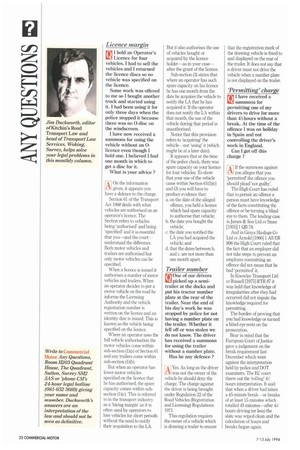'Permitting' charge
Page 24

If you've noticed an error in this article please click here to report it so we can fix it.
I have received a summons for permitting one of my drivers to drive for more than 4%hours without a break. At the time of the offence I was on holiday in Spain and not controlling the driver's work in England.
Can I get off this charge ?
If the summons against you alleges that you 'permitted' the offence you should plead 'not guilty'.
The High Court has ruled that to permit an offence a person must have knowledge of the facts constituting the offence or be turning a blind eye to them. The leading case is James & Son Ltd vs Smee [1955] 1 QB 78.
And in Grays Haulage Co Ltd vs Arnold [1966] 1 All ER 896 the High Court ruled that the fact that an employer did not take steps to prevent an employee committing an offence did not mean that he had 'permitted' it.
In Knowles Transport Ltd vs Russell [1975] RTR 87 it was held that knowledge of irregularities after they had occurred did not impute the knowledge required for permitting.
The burden of proving that you had knowledge or turned a blind eye rests on the prosecution.
Bear in mind that the European Court of Justice gave a judgement on the break requirement last December which went against the interpretation held by police and DOT examiners. The EC court threw out the 'rolling' 44 hours interpretation. It said that when a driver had taken a 45-minute break—or breaks of at least 15 minutes which totalled 45 minutes—after 434 hours driving (or less) the slate was wiped clean and the calculation of hours and breaks began again.
































































































